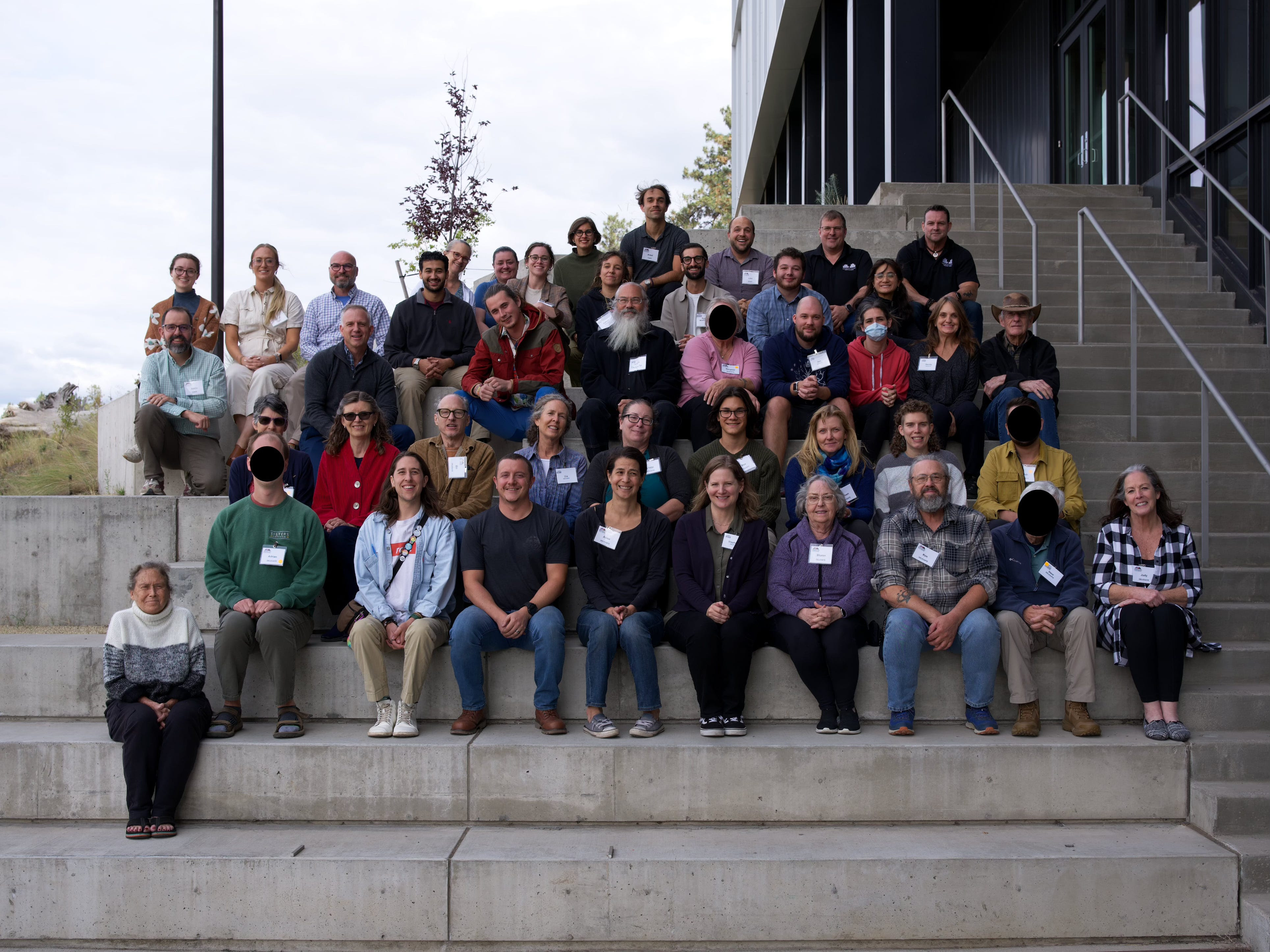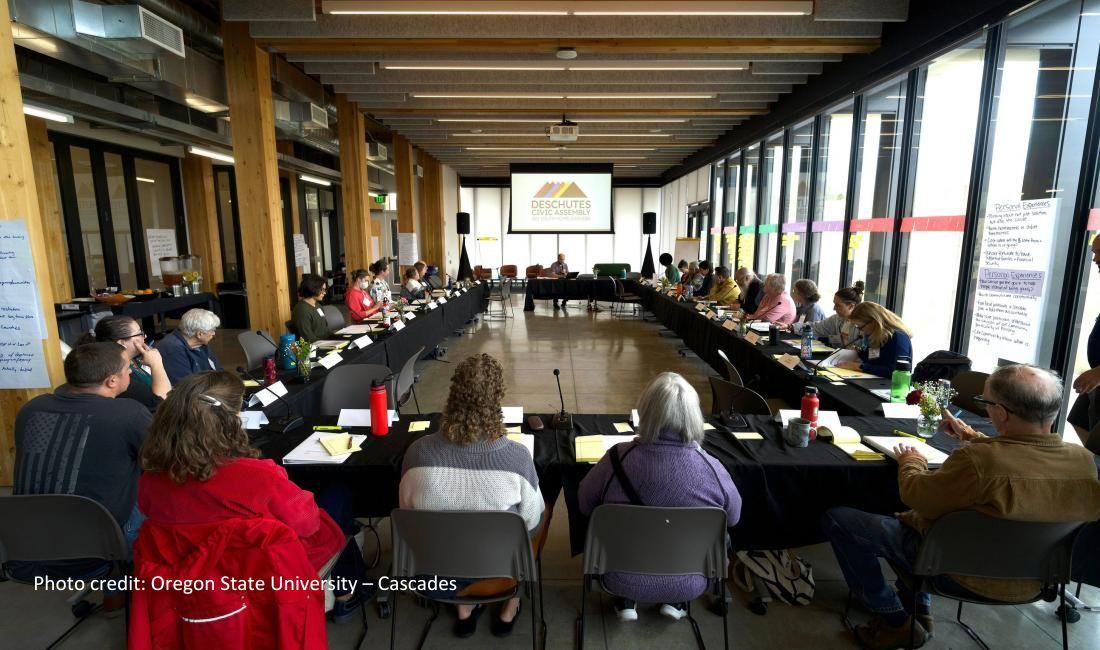Citizens assembly members get to work on youth homelessness in Deschutes County, Oregon
This piece was produced and first published by Democracy Next, as part of its newsletter. Photo credit: Oregon State University – Cascades
The questions came fast, and they were sharp.
Why haven’t we reduced the cost of building housing?
What are the transit options for students? Do they have access to bicycles?
I don't see anyone from the school district here. Why not?
Are young people being made aware of lucrative job options in the trades?
On a sunlit Saturday morning, a thin haze from wildfire smoke in the air, 30 strangers from across Deschutes County, Oregon filed in to a university hall. They grabbed muffins and cups of coffee, and took their seats around long tables.
Their home is changing. Over the past 30 years, Bend has grown from a small town based on timber, ranching and farming to a recreation and retirement destination, a trend accelerated by the COVID crisis—and housing prices have shot up. A recent report commissioned by the City of Bend showed that 81 percent of jobs in the area don’t pay enough to cover rent. Youth homelessness is rising.
The strangers hadn’t just come for breakfast. They came to solve problems. From the start, they brought a high level of energy and attention and began asking the pointed questions which need answering.
The Deschutes Civic Assembly on Youth Homelessness, as readers of this newsletter will know, is the culmination of nearly a year of planning and collaboration between DemocracyNext, Healthy Democracy, OSU Cascades, the MIT Center for Constructive Communication, Central Oregon Intergovernmental Council, Bend City Council, and Deschutes County.
This is also the world’s first tech-enhanced Citizens’ Assembly where the entirety of the conversations are being recorded in an effort to improve the quality, legitimacy, and transparency of the process, and to generate outputs grounded in the voices of assembly members. The recordings are fully anonymized so that individuals can speak freely during deliberations.
Members were selected through a two-stage lottery process. Invitation mailers were sent out to 12,500 random addresses across the county, and 250 invitations were sent out via community groups working with people currently experiencing homelessness. Members are being compensated for their time and costs for childcare and transportation are covered if needed.
The room is intended to act as a microcosm of the county: a few elderly men and women, several young people, and many in-between. Caregivers, students, factory workers, retirees, hunters, and more.
Early in the first day’s deliberations, assembly members began peppering panelists with thoughtful questions.
One man, a military veteran and worker at a bullet manufacturing company, has lived in Bend his whole life. He felt that it was important, now, to begin speaking up for the people who are natives to the area. His step-daughter is struggling with addiction and, he worries, is on the brink of homelessness
Some members had intense personal experiences with the issue. One woman had been homeless in her youth. Lately, she’s taken it upon herself to clean up leftover needles and trash left behind by campers near her property, using a store-bought hazmat suit. When a formerly homeless young person gave testimony to the assembly about his own harrowing experiences, she bit her lip, struggling to hold back tears.
With only six weeks left until the 2024 presidential election, daily American news headlines are dominated by campaign coverage of Kamala Harris and Donald Trump. At the assembly, the only mention of the federal government so far came in a discussion about decreases in federal funding for housing over recent decades. Although the room contained both Democrats and Republicans, partisanship was largely irrelevant to the task at hand, and went completely unmentioned. Deschutes County Commissioners Tony DeBone, a Republican, and Phil Chang, a Democrat, both came to show support for the process, as well as Bend Mayor Melanie Kiebler.
COCAP Executive Director and DemocracyNext Oregon Project Lead Josh Burgess drew a profound parallel between the assembly members’ service to their community and his own service, over the past 25 years, in the U.S. military. In his opening remarks welcoming the assembly members, Burgess said:
“So many times, I was thanked for my service. But I served alongside members of the State Department, NGOs, and other members of government and it pained me that they weren’t being thanked for their service.”
I was happy to see that during domestic struggles with COVID, first responders and medical providers and more were being thanked. But I still think it leaves a lot of people out: teachers and frontline workers, public servants.
You are now serving your community in a way that really hasn’t happened around here before. It hasn’t happened in many communities at all. So I want to be the first to thank each and everyone of you for your service. And I hope this will become a common thing in Central Oregon.”
The concluding weekend of the Deschutes Civic Assembly deliberations takes place this week on 4-6 October.
The Assembly's final recommendations will be shared with the Youth Action Board, the Central Oregon Intergovernmental Council, the Deschutes County Commissioners, and City of Bend Council. They will respond to the Civic Assembly's recommendations by the end of the year.
Interested in supporting this project, learning more, or observing the deliberations? Write to hello@demnext.org




